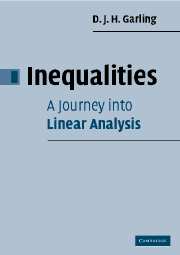Book contents
- Frontmatter
- Contents
- Introduction
- 1 Measure and integral
- 2 The Cauchy–Schwarz inequality
- 3 The AM–GM inequality
- 4 Convexity, and Jensen's inequality
- 5 The Lp spaces
- 6 Banach function spaces
- 7 Rearrangements
- 8 Maximal inequalities
- 9 Complex interpolation
- 10 Real interpolation
- 11 The Hilbert transform, and Hilbert's inequalities
- 12 Khintchine's inequality
- 13 Hypercontractive and logarithmic Sobolev inequalities
- 14 Hadamard's inequality
- 15 Hilbert space operator inequalities
- 16 Summing operators
- 17 Approximation numbers and eigenvalues
- 18 Grothendieck's inequality, type and cotype
- References
- Index of inequalities
- Index
10 - Real interpolation
Published online by Cambridge University Press: 06 July 2010
- Frontmatter
- Contents
- Introduction
- 1 Measure and integral
- 2 The Cauchy–Schwarz inequality
- 3 The AM–GM inequality
- 4 Convexity, and Jensen's inequality
- 5 The Lp spaces
- 6 Banach function spaces
- 7 Rearrangements
- 8 Maximal inequalities
- 9 Complex interpolation
- 10 Real interpolation
- 11 The Hilbert transform, and Hilbert's inequalities
- 12 Khintchine's inequality
- 13 Hypercontractive and logarithmic Sobolev inequalities
- 14 Hadamard's inequality
- 15 Hilbert space operator inequalities
- 16 Summing operators
- 17 Approximation numbers and eigenvalues
- 18 Grothendieck's inequality, type and cotype
- References
- Index of inequalities
- Index
Summary
The Marcinkiewicz interpolation theorem: I
We now turn to real interpolation, and in particular to the Marcinkiewicz theorem, stated by Marcinkiewicz in 1939. Marcinkiewicz was killed in the Second World War, and did not publish a proof; this was done by Zygmund in 1956. The theorem differs from the Riesz–Thorin theorem in several respects: it applies to sublinear mappings as well as to linear mappings; the conditions at the end points of the range are weak type ones and the conclusions can apply to a larger class of spaces than the Lp spaces. But the constants in the inequalities are worse than those that occur in the Riesz–Thorin theorem.
We begin by giving a proof in the simplest case. This is sufficient for many purposes; the proof is similar to the proof of the more sophisticated result that we shall prove later, and introduces techniques that we shall use there.
Theorem 10.1.1 (The Marcinkiewicz interpolation theorem: I)Suppose that 0 < p 0 < p < p 1 ≤ ∞, and that T : L p0(Ω, Σ, µ) + L p1(Ω, Σ, µ) → L 0(Φ, T, ν) is sublinear. If T is of weak type (p 0, p 0), with constant c 0, and weak type (p 1, p 1), with constant c 1, then T is of strong type (p, p), with a constant depending only on c 0, c 1, p 0, p 1and p.
Information
- Type
- Chapter
- Information
- Inequalities: A Journey into Linear Analysis , pp. 154 - 166Publisher: Cambridge University PressPrint publication year: 2007
